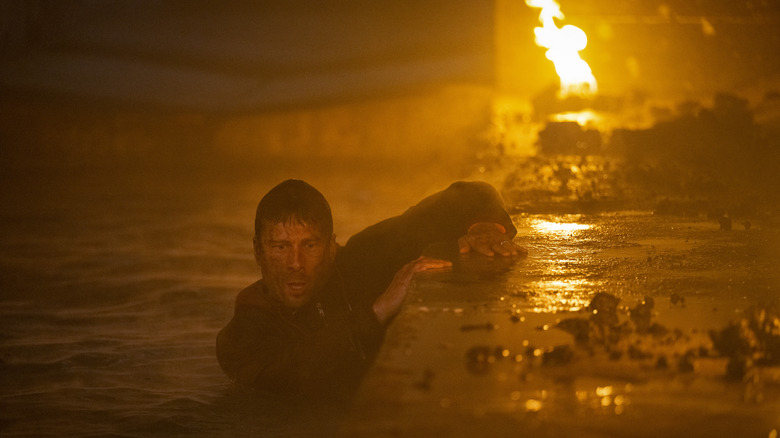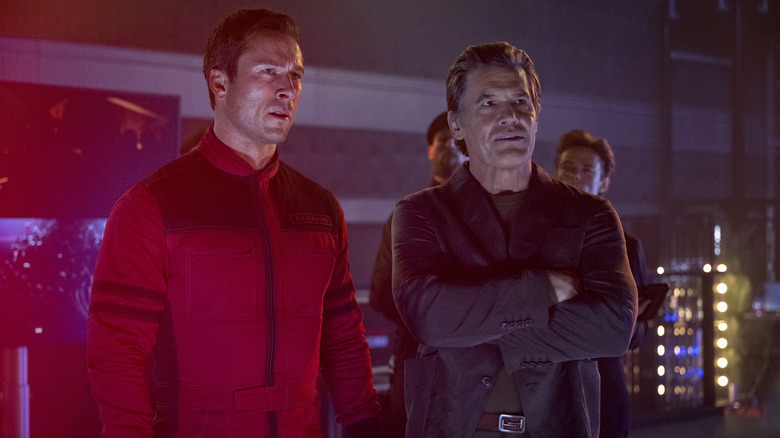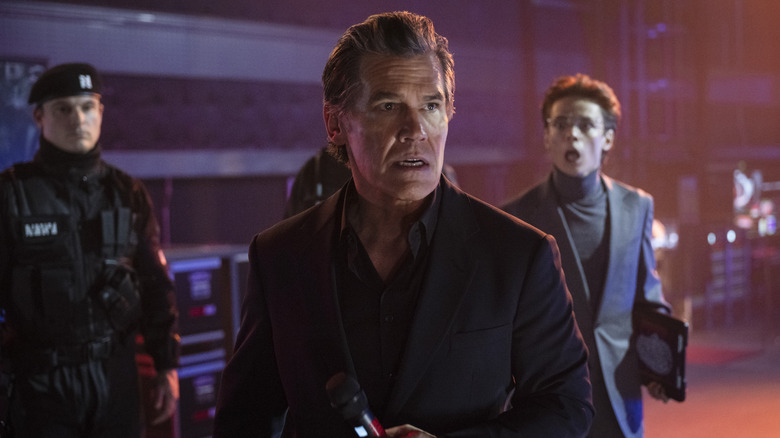How The Running Man Fails To Capture The Power Of Stephen King's Original Ending (Or Does It?)
This article contains spoilers for "The Running Man."
The concept of a happy ending has been with us since drama began, as it's conventional wisdom for audiences to want the protagonists to emerge victorious, prosperous, and alive. This understanding was transformed into practically a requirement during the days of the Production Code in Hollywood. While nuanced characterizations and tragedies could still happen, the Code ensured that the wicked would generally always be punished, the good would endure, and so on. As the Code came to prominence during cinema's formative decades, the trope of a happy ending, particularly for a genre film, became pretty much part and parcel. Fiction novels, on the other hand, never had this issue, as readers were far more used to a wide variety of possible finales.
When Stephen King wrote "The Running Man" in 1982 (under the pen name of Richard Bachman), he gave the tale of Ben Richards raging against a totalitarian government-cum-entertainment conglomerate called the Network an appropriately bleak and uncompromising ending, in which the hero deliberately flies a plane into the Network's headquarters. That ending was nowhere to be seen when the novel was first adapted into a movie in 1987, starring Arnold Schwarzenegger as Richards. That movie ended with Schwarzenegger as a macho liberator, as Richards and an underground resistance overthrew the Network. A conflation of both endings closes out this month's re-adaptation of "The Running Man," directed and co-written by Edgar Wright. On the surface, this hybrid finale feels like a cop out, a way to pay lip service to King's finale without actually following through. Upon deeper examination, however, it's possible that Wright and co-writer Michael Bacall have snuck a subversively clever bit of satire under the studio's (and most audience's) noses, and this ending is the key to that.
The book's ending, the 1987 ending, and the 2025 hybrid ending
King's novel ends with the revelation that Richards' family, whose welfare helped the Network chief Dan Killian manipulate Ben into joining The Running Man game show, was killed by home intruders. Richards seemingly accepts an offer to be the show's lead assassin, but a mortal wound during a battle onboard an airplane he's hijacked causes him to reprogram the craft to collide into the Network tower, killing himself and Killian in one blow. The post-9/11 connotations of this ending are allegedly part of why Wright knew from the beginning that his "The Running Man" wouldn't use it. Certainly, there was precedent set by Paul Michael Glaser's version, wrapping up with Schwarzenegger's Ben leading a ragtag resistance movement into the Running Man set, sending Killian (Richard Dawson) to his death, and getting the girl (Maria Conchita Alonso) in the process.
Wright and Bacall's ending seems to deliberately use a combination of both prior conclusions. Throughout the film, Killian (Josh Brolin) and the Network manipulate footage that Ben (Glen Powell) and the other Runners shoot of themselves to make them appear villainous to the public, so that when Killian reveals to Ben on the plane that his family has been murdered, Ben doesn't know if it's true or not. Rejecting the offer to be the star of his own show, Ben tries to incite revolution via a live speech, only for Killian to manipulate that footage, too, showing the public that Ben intended to fly the plane into the Network tower before it was shot down by a missile. Next, it's revealed that an escaped Ben and his family are still alive and reunited, and the film ends with Ben storming onto the set of The Running Man and shooting Killian, Schwarzenegger-style.
Wright's 'The Running Man' works as a feature-length satire
Obviously, that ending appears to be a conclusion that doesn't capture King's potent political commentary. Sure, having Richards heroically foil the oppressive government is dramatically satisfying, but it feels placating in a movie attempting to satirize the role of media in a fascistic regime while utilizing product placement from real-life brands. However, what if it's all one big con, a feature-length satire, the type of movie the Network might make to keep the populace in line? When you look at Wright's "The Running Man" through this lens, it becomes subversively clever.
Foremost is the character of Richards and Powell's performance, which is astutely calibrated for maximum impact. In the film, Killian points out how Richards is the perfect type of star for the country to rally behind, and he may as well be talking about Powell, who's been tapped for the last few years as Hollywood's next big thing. Powell's Richards is so likable it almost seems too calculated. When the film keeps calling into question whether what we're seeing is real or deepfake-style fabrications, it begs the question: What if "The Running Man" is employing the same ambiguity as seen in Christopher Nolan's "Inception," in which the manipulation of the dreamer (re: the audience) is happening while watching the movie itself?
This would mean that Wright's new ending, which seems calculated for the maximum Cinemascore possible, might be the punchline to the film's subliminal satire. Yes, it would mean the film is trying to have its cake and eat it too, but it also makes a statement arguably more powerful than King's novel did. Wake up, because the powers that be know how to keep you docile, and it's already working.
"The Running Man" is in theaters now.


